INTERNATIONAI DEBATE
Page 28
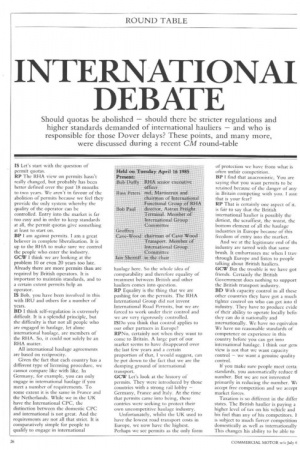
Page 29
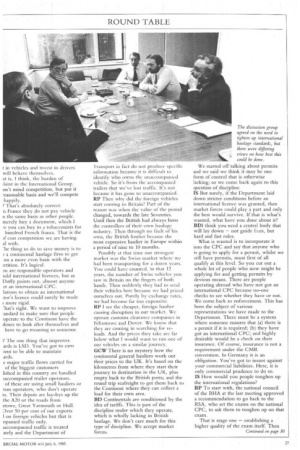
Page 32
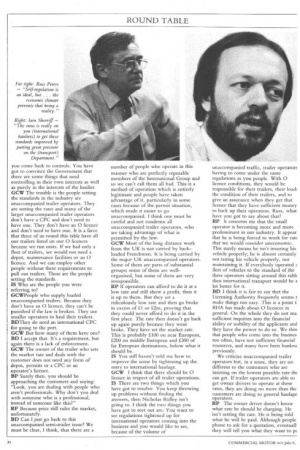
Page 33
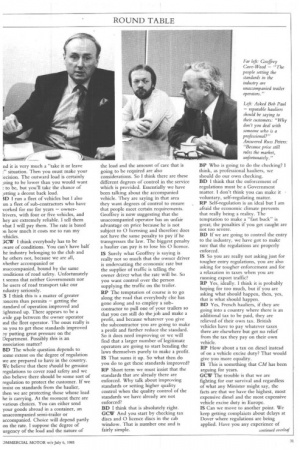
Page 34
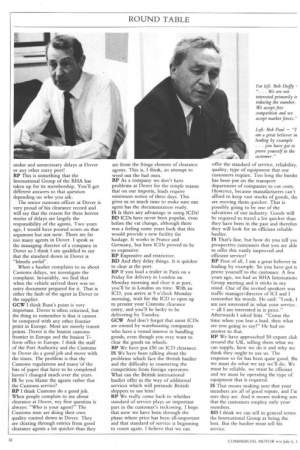
If you've noticed an error in this article please click here to report it so we can fix it.
Should quotas be abolished — should there be stricter regulations and higher standards demanded of international hauliers — and who is responsible for those Dover delays? These points, and many more, were discussed during a recent CM round-table
IS Let's start with the question of permit quotas.
RP The RHA view on permits hasn't really changed, but probably has been better defined over the past 18 months to two years. We aren't in favour of the abolition of permits because we feel they provide the only system whereby the quality of the operator can be controlled. Entry into the market is far • too easy and in order to keep standards at all, the permit quotas give something at least to start on.
BP I am against permits. I am a great believer in complete liberalisation. It is up to the RHA to make sure we control the people who enter the industry. GCW I think we are looking at the problem 10 or even 20 years too late. Already there are more permits than are required by British operators. It is important to maintain standards, and to a certain extent permits help an operator.
IS Bob, you have been involved in this with IRU and others for a number of years.
BD I think self-regulation is extremely difficult. It is a splendid principle, but the difficulty is that not all people who are engaged in haulage, let alone international haulage, are members of the RHA. So, it could not solely be an RHA matter.
All international haulage agreements are based on reciprocity.
Given the fact that each country has a different type of licensing procedure, we cannot compare like with like. In Germany, for example, you can only engage in international haulage if you meet a number of requirements. To some extent it is the same in France and the Netherlands. While we in the UK have the International CPC, the distinction between the domestic CPC and international is not great. And the requirements are not all that strict. It is comparatively simple for people to qualify to engage in international haulage here. So the whole idea of comparability and therefore equality of treatment between British and other hauliers comes into question.
RP Equality is the thing that we are pushing for on the permits. The RHA International Group did not invent International Road Permits, but we are forced to work under their control and we are very rigorously controlled. ISDo you think that control applies to our other partners in Europe?
RPNo, certainly not when they want to come to Britain. A large part of our market seems to have disappeared over the last few years and a certain proportion of that, I would suggest, can be put down to the fact that we are the dumping ground of international transport.
GCW Let's look at the history of permits. They were introduced by those countries with a strong rail lobby — Germany, France and Italy. At the time that permits came into being, these contries were seeking to protect their own uncompetitive haulage industry.
Unfortunately, whilst the UK used to have the lowest road transport costs in Europe, we now have the highest. Perhaps we sec permits as the only form of protection we have from what is often unfair competition.
BP I find that anacronistic, You are saying that you want permits to be retained because of the danger of any in Britain competing with you. I assu that is your fear?
RP That is certainly one aspect of it. is fair to say that the British international haulier is possibly the dirtiest, the scruffiest, the worst, the bottom element of all the haulage industries in Europe because of this freedom of entry into the market.
And we at the legitimate end of the industry are tarred with that same brush. It embarrasses me when I tray, through Europe and listen to people talking about British hauliers.
GCW But the trouble is we have got friends. Certainly the British Government does nothing to support the British transport industry.
BD With capacity control in all these other countries they have got a much tighter control on who can get into ti industry. They have to produce evide of their ability to operate locally beim they can do it nationally and internationally. We have no equivalen We have no reasonable standards of competence or experience in this country before you can get into international haulage. I think our gem view is not that we want capacity control — we want a genuine quality control.
If you make sure people meet certa: standards, you automatically reduce tl number. But we are not interested primarily in reducing the number. We accept free competition and we accept market forces.
Taxation is so different in the differ states. The British haulier is paying a higher level of tax on his vehicle and his fuel than any of his competitors. Iis subject to much fiercer competition domestically as well as internationally This changes his ability to be able to t in vehicles and invest in drivers will behave themselves.
at is, I think, the burden of
,laint in the International Group. on't mind competition, but put it :-easonable basis and we'll compete happily.
1 That's absolutely correct.
n France they do not pay vehicle 11 the same basis as other people. merely buy a document, which I te you can buy in a tobacconists for hundred French francs. That is the if cost competition we are having al with.
The thing to do to save money is to ) a continental haulage firm to get on a more even basis with the ■ etition. Its logical.
Du are responsible operators and told international licences, but as Duffy points out, almost anyone et an international CPC.
lations to obtain an international Ltor's licence could surely be made more rigid.
That's right. We want to improve :andard to make sure that people operate to the Continent have the thence to look after themselves and have to go moaning to someone 7 The one thing that improves ards is LSD. You've got to earn ient to be able to maintain ards.
e major traffic flows carried for of the biggest customers lished in this country are handled laccompanied trailer operators.
of these are using small hauliers or Tian operators, who don't operate ts. Their depots are lay-bys up the the A20 or the roads from stowe, Great Yarmouth or Hull.
Dyer 50 per cent of our exports 1 on foreign vehicles but that is npanied traffic only.
iaccompanied traffic is treated ately and the Department of
Transport in fact do not produce specific information because it is difficult to identify who owns the unaccompanied vehicle. So it's from the accompanied trailers that we've lost traffic. It's not because it has gone to unaccompanied. RP Then why did the foreign vehicles start coming to Britain? Part of the reason was when the value of the pound changed, towards the late Seventies. Until then the British had always been the controllers of their own haulage industry. Then through no fault of his own, the British haulier became the most expensive haulier in Europe within a period of nine to 10 months.
Possibly at that time our strongest market was the Swiss market where we had been transporting for a dozen years. You could have counted, in that 12 years, the number of Swiss vehicles you saw in Britain on the fingers of both hands. Then suddenly they had to send their vehicles here because we had priced ourselves out. Purely by exchange rates, we had become far too expensive. RP I see the cheaper, foreign haulier causing disruption in our market. We operate customs clearance companies in Felixstowe and Dover. We know that they are coming in searching for reloads. And the prices they take are far below what I would want to run one of our vehicles on a similar journey. GCW There is no mystery how the continental general hauliers work out their prices to the UK. It's based on the kilometres from where they start their journey to destination in the UK, plus empty back to the British ports; and the round trip seafreight to get them back to the Continent where they can collect a load for their own area.
BD Continentals are conditioned by the idea of tariffs. This is part of the discipline under which they operate, which is wholly lacking in British haulage. We don't care much for this type of discipline. We accept market forces.
We started off talking about permits and we said we think it may be one form of control that is otherwise lacking; so we come back again to this question of discipline.
IS But surely, if the Department laid down stricter conditions before an international licence was granted, then market forces could play a part and only the best would survive. If that is what's wanted, what have you done about it? BDI think you need a central body that will lay down — not guide lines, but hard and fast rules.
What is wanted is to incorporate it into the CPC and say that anyone who is going to apply for a permit, whilst we still have permits, must first of all qualify at this level. So you cut out a whole lot of people who now might be applying for and getting permits by devious means. There are people operating abroad who have not got an international CPC because no-one checks to see whether they have or not. We come back to enforcement_ This has been the subject of various representations we have made to the Department. There must be a system where someone ensures that (a) there is a permit if it is required; (b) they have got an international CPC; and highly desirable would be a check on their insurance. Of course, insurance is not a requirement under the CMR convention. In Germany it is an obligation. You've got to insure against your commercial liabilities. Here, it is only commercial prudence to do so. IS How would you people toughen up the international regulations?
RP To start with, the national council. of the RHA at the last meeting approved a recommendation to go back to the RSA, who set the exams on the national CPC, to ask them to toughen up on that exam.
That is stage one — establishing a higher quality of the exam itself. Then you come back to controls. You have got to convince the Government that there are some things that need controlling in their own interests as well as purely in the interests of the haulier. GCW The trouble is the people setting the standards in the industry are unaccompanied trailer operators. They are setting the rates and many of the larger unaccompanied trailer operators don't have a CPC and don't need to have one_ They don't have an 0 licence and don't need to have one. It is a farce that three of us round this table have all our trailers listed on our 0 licences because we run units. If we had only a fleet of traders, we would not need a depot, maintenance facilities or an 0 licence. And we can employ other people without these requirements to pull our trailers. These are the people setting the standards.
IS Who are the people you were referring to?
GCWPeople who supply loaded unaccompanied trailers. Because they don't have an 0 licence, they can't be punished if the law is broken. They use smaller operators to haul their trailers. BDThey do need an international CPC for going to the port.
GCW But how many of them have one? I3D I accept that. It's a requirement, but again there is a lack of enforcement. GCW The owner of the trailer who sets the market rate and deals with the customer does not need any form of depot, permits or a CPC or an operator's licence.
BP Surely then, you should be approaching the customers and saying: "Look, you are dealing with people who aren't professionals. Why don't you deal with someone who is a professional, instead of someone like this?"
RP Because price still rules the market, unfortunately.
BD Can I just go back to this unaccompanied semi-trailer issue? We • tnust be clear, I think, that there are a number of people who operate in this manner who are perfectly reputable members of the International Group and so we can't call them all bad. This is a method of operation which is entirely legitimate and people have taken advantage of it, particularly in some cases because of the permit situation, which made it easier to go unaccompanied. I think one must be careful and not condemn all unaccompanied trailer operators, who are taking advantage of what is permitted by the law.
GCW Most of the long distance work from the UK is not carried by backloaded Frenchmen. It is being carried by the major UK unaccompanied operators. Some of them are parts of substantial groups; some of them are wellorganised, but some of them are very irresponsible.
RP If operators can afford to do it at a low rate and still show a profit, then it is up to them. But they set a ridiculously low rate and then go broke in excess of £.1 or £2m, proving that they could never afford to do it in the first place. The rate then doesn't go back up again purely because they went broke. They have set the market rate. This is probably £.100 on near European, £200 on middle European and OM of far European destinations, below what it should be.
IS You still haven't told me how to improve the scene by tightening up the entry to international haulage.
GCW I think that there should be 0 licence in respect of all trailer operations. IS There are two things which you have got to resolve. You keep throwing up problems without finding the answers, then Nicholas Ridley isn't going to. I think the two things you have got to sort out are: You want to see regulations tightened up for international operators coming into the business and you would like to see, because of the volume of
unaccompanied traffic, trailer operaton having to come under the same regulations as you people. With 0 licence conditions, they would be responsible for their trailers, their loath the condition of their trailers, arid to give an assurance when they get that Licence that they have sufficient money to back up their operation. Russ, what have you got to say about that? RP It concerns me that the small operator is becoming more and more predominant in our industry. It appear that he is being forced to work for rate that we would consider uneconomic_ This surely means he isn't insuring his vehicle properly; he is almost certainly not taxing his vehicle properly, nor maintaining it. If everybody operated fleet of vehicles to the standard of the three operators sitting around this tabh then international transport would be a lot better for it.
BD I think it is fair to say thet the Licensing Authority frequently seems t make things too easy. This is a point f. RHA has made about 0 licences in general. On the whole they do not ma sufficient inquiries into the financial ability or stability of the applicants and they have the power to do so. We thin that people who come into the busines too often, have not sufficient financial resources, and many have been bankru previously.
We criticise unaccompanied trailer operators but, in a sense, they are no different to the customers who are insisting on the lowest possible rate du can get. If trailer operators are able to get owner drivers to operate at these rates, they are doing no more than the customers are doing to general haulage operators.
RP The owner driver doesn't know what rate he should be charging. He isn't setting the rate. He is being told what he will be paid. Although people phone to ask for a quotation, eventual!. they will tell you what they want to
nd it is very much a "take it or leave :" situation. Then you must make your iecision. The outward load is certainly ;oing to be lower than you would want : to be, but you'll take the chance of ;etting a decent back load.
ID I run a fleet of vehicles but I also un a fleet of sub-contractors who have worked for me for years — ownerlrivers, with four or five vehicles, and hey are extremely reliable. I tell them vhat I will pay them. The rate is based in how much it costs me to run my 'chides.
77CW I think everybody has to be Lware of conditions. You can't have half he industry belonging to the club and he others not, because we are all, whether accompanied or maccompanied, bound by the same :onditions of road safety. Unfortunately t seems that neither Governments nor he users of road transport take our ndustry seriously.
S I think this is a matter of greater :oncern than permits — getting the aandard of operation improved and :ightened up. There appears to be a Nide gap between the owner operator ind the fleet operator. The onus really is 3n you to get these standards improved 3y putting great pressure on the Department. Possibly this is an association matter?
BD The whole question depends to 3ome extent on the degree of regulation we are prepared to have in the country_ We believe that there should be genuine regulations to cover road safety and we also believe there should be some sort of regulation to protect the customer. If we insist on standards from the haulier, then we are protecting those whose load he is carrying. At the moment there are various choices. You can either send your goods abroad in a container, an unaccompanied semi-trailer or accompanied. Choice will depend partly on the rate. I suppose the degree of urgency of the load and the nature of the load and the amount of care that is going to be required are also considerations. So I think there are these different degrees of control in the service which is provided. Essentially we have been talking about the accompanied vehicle. They are saying in that area they want degrees of control to ensure that people meet certain requirements. Geoffrey is now suggesting that the unaccompanied operator has an unfair advantage on price because he is not subject to 0 licensing and therefore does not have the same penalty to pay if he transgresses the law. The biggest penalty a haulier can pay is to lose his 0 licence.
IS Surely what Geoffrey is saying is really not so much that the owner driver is undercutting the economic rate but the supplier of traffic is telling the owner driver what the rate will be. So you want control over the person supplying the traffic on the trailer.
RP The temptation of course is to go along the road that everybody else has gone along and to employ a subcontractor to pull one of your trailers so that you can still do the job and make a profit, and because whatever you give the subcontractor you are going to make a profit and further reduce the standard. So it does need improving or we will find that a larger number of legitimate operators are going to start bending the laws themselves purely to make a profit. IS That sums it up. So what then do you do to get these standards improved? RP Short term we must insist that the standards that are already there are enforced. Why talk about improving standards or setting higher quality control when the quality control of the standards we have already are not enforced?
BD I think that is absolutely right. GCW And you start by checking tax discs and 0 licence discs in the cab window. That is number one and is fairly simple. BP Who is going to do the checking? I think, as professional hauliers, we should do our own checking.
BD I think that the enforcement of regulations must be a Government matter. I don't think you can make it voluntary, self-regulating matter. RP Self-regulation is an ideal but I am afraid the economic climate prevents that really being a reality. The temptation to make a "fast buck" is great; the penalties if you get caught are not too severe.
BD If we are going to control the entry to the industry, we have got to make sure that the regulations arc properly enforced.
IS So you are really not asking just for tougher entry regulations, you are also asking for tougher enforcement and for a relaxation in taxes when you are running export traffic?
RP Yes, ideally. I think it is probably hoping for too much, but if you arc asking what should happen, then, yes, that is what should happen.
BD Yes, French hauliers, if they are going into a country where there is an additional tax to be paid, they are relieved of their own tax. British vehicles have to pay whatever taxes there are elsewhere but get no relief from the tax they pay on their own vehicle.
RP Flow about a tax on diesel instead of on a vehicle excise duty? That would give you more equality.
:IS This is something that CM has been arguing for years.
GCW The trouble is that we are fighting for our survival and regardless of what any Minister might say, the facts are that we have the highest, most expensive diesel and the most expensive vehicle excise duty in Europe.
IS Can we move to another point. We keep getting complaints about delays at Dover where regulations are being applied. Have you any experience of undue and unnecessary delays at Dover or any other entry port?
RP This is something that thc International Group of the RHA has taken up for its membership. You'll get different answers to that question depending on who you ask.
The senior customs officer at Dover is very proud of his clearance record and will say that the reason for these horror stories of delays are largely the responsibility of the agents. Two years ago, I would have poured scorn on that argument but not now. There are far too many agents in Dover. I speak as the managing director of a company in Dover so I think I am qualified to say that the standard down in Dover is "bloody awful".
When a haulier complains to us about Customs delays, we investigate the complaint. Invariably, we find that when the vehicle arrived there was no entry document prepared for it. That is either the fault of the agent in Dover or the supplier.
GCW I think Russ's point is very important. Dover is often criticised, but the thing to remember is that it cannot be compared with any other frontier point in Europe. Most are merely transit points. Dover is the busiest customs frontier in Europe and the busiest Tform office in Europe. I think the staff of the Port Authority and the Customs in Dover do a good job and move with the times. The problem is that the Customs regulations and many 'of the bits of paper that have to be completed haven't changed much over the years. IS So you blame the agents rather that the Customs service?
RP I think Customs do a good job. When people complain to me about clearance at Dover, my first question is always: "Who is your agent?" The Customs men are doing their own quality control down in Dover. They are clearing through entries from good clearance agents a lot quicker than they are from the fringe element of clearance agents. This is, I think, an attempt to weed out the bad ones.
BP As a company we don't have problems at Dover for the simple reason that on our imports, loads require minimum notice of three days. This gives us so much time to make sure our agent has the documentation ready. IS Is there any advantage in using ICDs? BD ICDs have never been popular, even before the vat change, although there was a feeling some years back that this would provide a new facility for
haulage. It works in France and Germany, but here ICDs proved to be so expensive.
RP Expensive and restrictive.
BD And they delay things. It is quicker to clear at the port.
RP If you load a trailer in Paris on a Friday for delivery in London on Monday morning and clear it at port, you'll be in London on time. With an [CD, you arrive at 9 o'clock Monday morning, wait for the [CD to open up to present your Customs clearance entry, and you'll be lucky to be delivering by Tuesday.
GCW And don't forget that most ICDs are owned by warehousing companies who have a vested interest in handling goods, even though you may want to clear the goods on wheels.
BP We have put £50 on ICD clearance. IS We have been talking about the problems which face the British haulier and the difficulty in countering the competition from foreign operators. What can the British international haulier offer in the way of additional services which will persuade British shippers to use him?
RP We really come back to whether standard of service plays an important part in the customer's reckoning. I hope that now we have been through the phase where price has been all-important and that standard of service is beginning to count again. I believe that we can offer the standard of service, reliability, quality, type of equipment that our customers require. Too long the burdei has been put on the transport department of companies to cut costs. However, because manufacturers can't afford to keep vast stocks of goods, the are moving them quicker. That is possibly going to be one of the salvations of our industry. Goods will be required to travel a lot quicker than they have been in the past and therefort they will look for an efficient reliable haulier, IS That's fine, but how do you tell pot prospective customers that you are able to offer this vastly improved and efficient service?
BP First of all, I am a great believer in leading by example. So you have got tt prove yourself to the customer. A few years ago, we had an RHA Internationa Group meeting and it sticks in my mind. One of the invited speakers was traffic manager/director of ICI and 1 remember his words. He said: "Look, I am not interested in what your service : — all I am interested in is price." Afterwards I asked him. "Come the time when you lose a load, then what are you going to say?" He had no answer to that.
RP We have approached 50 export club around the UK, telling them what we can supply, how we do it and why we think they ought to use us. The response so far has been quite good. Bu we must do what we say we'll do. We must be reliable, we must be efficient and we must be operating the type of equipment that is required.
IS That means making sure that your members are all of good repute, and I'm sure they are. And it means making sure that the customers employ only your members.
BD I think we can sell in general terms the International Group as being the best. But the haulier must sell his service.




































































































